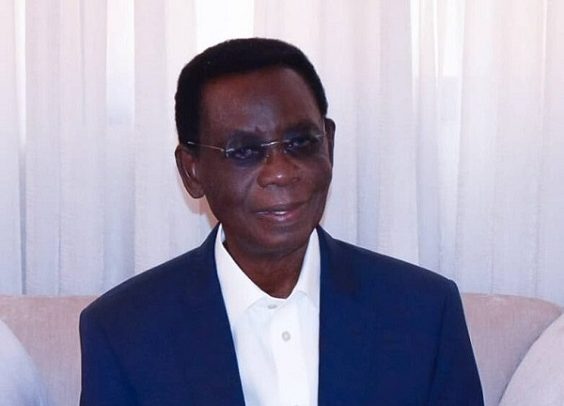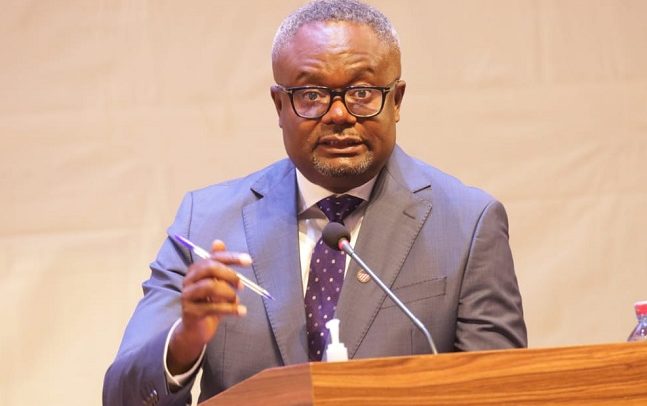
By Thomas-Moore ADINGO
The country’s expectations that the planned 2026 drilling campaign in the Voltaian Basin (VB) will help reverse the country’s steep oil production decline are “highly unrealistic”, the Africa Sustainable Energy Centre (ASEC) has cautioned.
Instead, it said a more realistic way to arrest the fall is to prioritise near-term stabilisation through the West Cape Three Points Block 2 (WCTP2) while tightening governance at the Ghana National Petroleum Corporation (GNPC).
Speaking to Business and Financial Times, Justice Ohene-Akoto – Executive Director at ASEC – said the VB is a long-term strategic undertaking and “cannot meaningfully influence Ghana’s acute production downturn within the next five years”.
“The first well in October 2026 is a stratigraphic well – not a production well. Even if Ghana makes a commercial discovery, frontier basin timelines mean first oil cannot arrive before 2033 to 2036. The crisis is happening now, in 2025 through to 2028. The VB simply cannot reverse the trend within that window,” he explained.
ASEC’s assessment comes as the country grapples with a sharp fall in oil output and petroleum revenues. Production has declined for five consecutive years, with mature fields – Jubilee, TEN and Sankofa-Gye Nyame – experiencing accelerated depletion.
The fiscal impact has been severe as petroleum receipts continue to fall sharply, constraining public finances and undermining macroeconomic stability.
GNPC’s operatorship plan
Mr. Ohene-Akoto warned that GNPC’s ambition to assume greater operating responsibility faces significant institutional and financial risks, especially in light of recent findings by oversight bodies.
“The biggest risk to the VB and WCTP2 is governance failure,” he stated. “GNPC has systematically breached the Petroleum Revenue Management Act by retaining over US$488.7million that should have gone into the Petroleum Holding Fund. That level of non-compliance threatens every major upstream initiative.”
He added that diverting nearly half of US$768.35million into unapproved Level B activities – cited in the Auditor-General’s report – is “concrete evidence of institutional weakness”.
“These diversions, including payments such as GH¢4.9million for a golf club house, directly undermine core upstream projects. GNPC must restore governance integrity before it expands its upstream footprint,” he said.
Operationally, he noted that GNPC Explorco is “not yet technically prepared for deepwater operatorship”, evidenced by the corporation’s need to rely on a “technically strong deepwater partner” in the proposed WCTP2 structure.
Voltaian Basin remains critical – but only for long-term stability
Despite cautioning against inflated rhetoric around the VB, ASEC emphasised its strategic importance in securing the country’s long-term hydrocarbon future.
“The VB is indispensable for post-2035 resource replacement. It is Ghana’s long-term anchor and a critical platform for developing GNPC’s operatorship capability,” Mr. Ohene-Akoto explained. “But what it is not is a short-term revenue solution.”
He said government messaging portraying the basin as an imminent “game-changer” risks creating false expectations, even though its long-term value is unquestionable.
State-led WCTP2 takeover seen as necessary fiscal stabilisation
ASEC strongly endorsed government’s proposed state-led intervention in WCTP2, describing it as “the most strategically important near-term measure available to the state”.
“With over 1.5 billion barrels of oil and up to 1.2 trillion cubic feet of gas in place, WCTP2 is Ghana’s best chance of delivering production between 2028 and 2032. If we do nothing, the asset risks remaining idle at the worst possible moment for national revenues,” Mr. Ohene-Akoto said.
However, he stressed that the intervention must be executed with “unparalleled transparency”.
“A full independent valuation, commercial audit and technical assessment must be published before any acquisition. Anything short of that will chill the investment climate and expose the state to reputational risk,” he cautioned.
ASEC further noted that the country’s upstream policy is now at a “critical inflection point”, requiring careful sequencing of actions to stabilise revenues while securing future resources.
“The VB is a long-term project requiring patient, ring-fenced capital. WCTP2 is the immediate stabilisation lever. Government must reconcile these timelines clearly,” Mr. Ohene-Akoto said.
Recommendations
ASEC has outlined three priority actions for government. Under the first, the think-tank is advocating strict institutional and financial accountability – including an immediate transfer of the US$488.8million owed to the Petroleum Holding Fund, full adherence to GNPC’s approved budgets, an end to all unapproved expenditure and strengthened oversight to restore the corporation’s credibility.
The second recommendation centres on transparency in the WCTP2 transaction. ASEC is calling for full public disclosure of the valuation, cost audit and technical due diligence findings, as well as assurances that any acquisition meets stringent commercial and technical criteria.
The final recommendation urges government to clarify and ring-fence GNPC’s operatorship pathway. This includes designating the Voltaian Basin as a structured training ground for GNPC Explorco, ensuring WCTP2 is developed with a world-class deepwater operato and protecting capital allocated to the VB from political interference and unrealistic execution timelines.
Mr. Ohene-Akoto concluded that the state’s ability to navigate this period will depend not on geology but discipline. “We have the assets. What we lack is accountability and sequencing. If Ghana gets the governance right, WCTP2 can stabilise the present and the Voltaian Basin can secure the future.”
The post Voltaian Basin cannot reverse oil decline before 2033 – ASEC warns appeared first on The Business & Financial Times.
Read Full Story


















Facebook
Twitter
Pinterest
Instagram
Google+
YouTube
LinkedIn
RSS